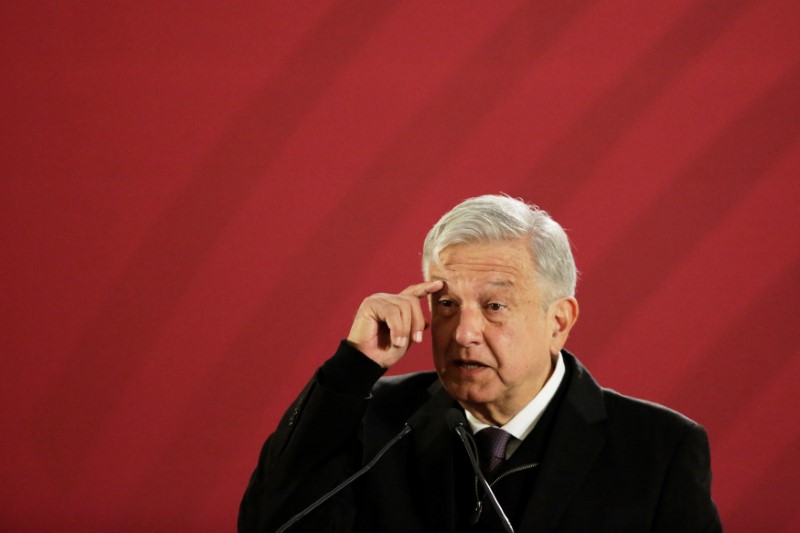By Marianna Parraga
MEXICO CITY (Reuters) - Bottlenecks for offloading imported fuel are forming at some Mexican oil ports following government orders to shut pipelines to limit losses from widespread fuel theft, according to traders and Refinitiv Eikon data.
With storage limited in Mexico, the move by President Andres Manuel Lopez Obrador to shut pipelines and move fuel mostly by rail and truck has slowed transport, causing long lines for consumers and slowed deliveries at ports, where more than 7 million barrels of fuel - enough for several days of use in Mexico - languish.
The crackdown on fuel theft, a crime that has drained billions of dollars from state coffers and is blamed for rising violence in some regions, is the leftist president's first major move against criminals and corruption since taking office in December, but risks angering consumers and hurting the economy.
Lines of drivers snaked from gas stations in Mexico City on Wednesday as the government crackdown on fuel theft led to panic purchases, despite assurances from Lopez Obrador that his efforts were succeeding.
State-run Petroleos Mexicanos (Pemex) started building an inventory on Dec. 20 in preparation for pipeline closures, Energy minister Rocio Nahle said on Wednesday. She denied there was fuel scarcity in Mexico, which is among the world's top four importers of gasoline.
But fuel distribution to stations has slowed in recent days because of a switch to much less efficient truck transportation. Backlogs of tankers bringing imported fuel have started forming around Pemex's maritime terminals, which are not draining inventories at their typical rhythm, also creating delays for tanker unloading, the traders said.
As of Jan. 9, Mexico's main port of entry for fuel imports, Pajaritos in the Gulf, had 15 tankers waiting to discharge, some of them since December. The neighboring Tuxpan terminal had 9 tankers waiting to discharge gasoline and other fuel, including liquefied petroleum gas (LPG), according to the Eikon data.
The 24 vessels are jointly carrying about 7.2 million barrels of fuel, enough for nearly five days of consumption.
As limitations to import fuel by vessel have grown, Pemex's trading arm PMI has tapped suppliers to secure fuel by rail from the United States, one of the traders added.
"PMI is securing as much by rail as possible, both for gasoline and ultra low sulfur diesel (ULSD). This is limited by the rail loading and unloading capabilities still in both the U.S. and Mexico," the trader said.
The company has had no problems finding suppliers in the United States, another trader said, adding that fuel shortages in some areas of Mexico are not the result of fewer imports, but caused by domestic distribution hiccups.
INSUFFICIENT DOMESTIC FUEL
Pemex is producing some 200,000 bpd of gasoline, Lopez Obrador said, slightly above November's average of 171,700 bpd.
"There's enough fuel in the country," Lopez Obrador said on Monday. He said that retail domestic prices have not increased mostly because of lower international prices.
But Pemex's fuel production dropped by 33 percent from January to November of last year compared with all of 2017, and it has recently struggled to maintain refineries in service.
To compensate for declining domestic fuel output, Pemex has ramped up imports. For last year through November, it purchased 975,200 bpd, about two thirds of Mexico's consumption, compared with the 799,500 bpd it imported in 2016, which represented 49 percent of consumption.
Some independent retailers that started operating in Mexico because of the energy reform are separately importing themselves. All the purchases are making Mexico increasingly dependent on imported fuel, mostly from the United States.
But the country still only has enough storage capacity for three days of consumption, causing bottlenecks to show up quickly.

"More vessels booked from U.S. West Coast refineries in December, are on the way, causing more of a logjam. If the plan was to use trucks instead of pipelines to move product, it has failed," one broker said.